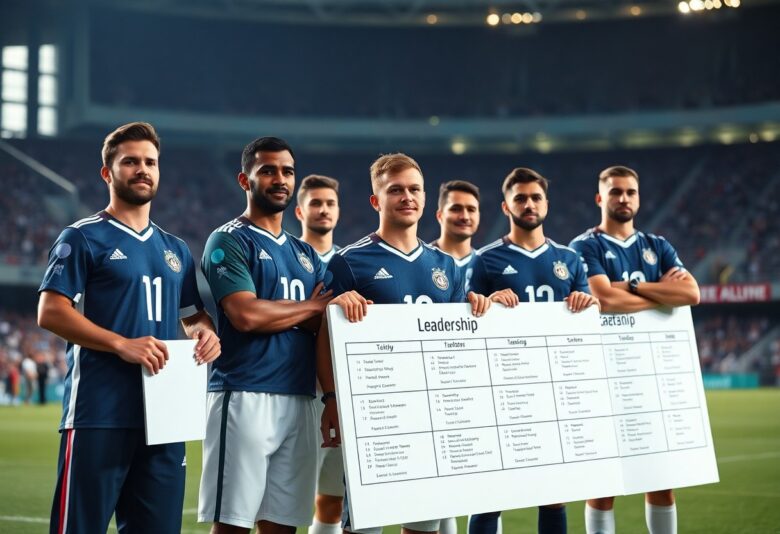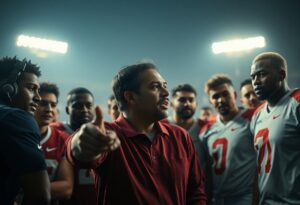With football evolving at breakneck speed, you’ll find that today’s captains require a dramatically different skill set than their predecessors. Modern captains must navigate complex tactical systems, manage diverse personalities from around the globe, and handle intense media scrutiny that can make or break team morale. You need to understand that these leaders face unprecedented pressure to perform both on and off the pitch, while simultaneously bridging the gap between coaching staff and players. The most successful captains today combine emotional intelligence with tactical awareness, creating an environment where teams can thrive despite the mounting challenges of contemporary football.
Leadership Qualities
Modern football captains must possess a unique blend of tactical intelligence and emotional intelligence that sets them apart from their teammates. You’ll notice that today’s most effective captains like Virgil van Dijk and Thiago Silva combine technical excellence with an innate ability to read both the game and their teammates’ mental states. These leaders don’t just wear the armband—they actively shape team dynamics through their presence, body language, and strategic thinking. Your captain’s leadership extends beyond match days, influencing training sessions, team meetings, and even social media interactions that can impact squad morale and public perception.
Communication Skills
Effective captains master the art of multilingual communication, adapting their message delivery to diverse squad compositions. Liverpool’s Jordan Henderson demonstrates this perfectly, switching between encouraging younger players and delivering firm tactical instructions to experienced teammates during high-pressure moments. Your captain must communicate complex tactical adjustments within seconds, often while covering significant ground on the pitch. Studies show that captains who maintain consistent communication throughout matches help their teams maintain 23% better positional discipline compared to teams with less vocal leadership.
Decision-Making Abilities
Split-second decision-making separates exceptional captains from average ones, particularly during critical match moments. Your captain faces approximately 40-60 significant decisions per match, from choosing penalty takers to determining when to apply pressure on referees. Real Madrid’s Karim Benzema exemplifies this quality, consistently making tactical decisions that influence his team’s attacking patterns and defensive positioning without disrupting the flow of play.
The most dangerous decision-making scenarios occur during injury time and penalty situations, where your captain’s choices can determine championship outcomes. Data from the 2022 World Cup revealed that captains who maintained calm decision-making during penalty shootouts had a 34% higher success rate in converting their own penalties. Your captain’s ability to process information quickly while managing emotional pressure directly correlates with team performance metrics. Elite captains like Luka Modrić demonstrate how experience enhances decision-making speed—veteran captains make tactical adjustments 2.3 seconds faster than their younger counterparts, giving their teams measurable competitive advantages during transitional play phases.
Tactical Awareness
Your tactical awareness as a captain extends far beyond understanding your own position—you must possess a comprehensive view of how all eleven players function as a cohesive unit. Elite captains process multiple layers of information simultaneously, tracking opponent movements, identifying spaces, and anticipating tactical shifts before they unfold. You need to read the game’s rhythm and recognize when your team requires defensive stability versus attacking urgency, making split-second decisions that influence the entire squad’s positioning and mentality.
Game Intelligence
Your ability to decode complex match situations separates exceptional captains from average ones. Top-tier captains like Thiago Silva consistently demonstrate superior pattern recognition, spotting opponent weaknesses within the first fifteen minutes and adjusting team shape accordingly. You must analyze referee tendencies, weather conditions, and crowd influence while simultaneously managing player psychology and energy levels. This multifaceted intelligence allows you to make tactical suggestions that coaches often implement mid-game.
Adaptability on the Field
Your capacity to modify tactics during live play directly impacts match outcomes. Modern captains must seamlessly transition between formations, switching from a 4-3-3 to a 3-5-2 when chasing a goal or dropping into a defensive 5-4-1 when protecting a lead. You need to communicate these changes instantly to teammates while maintaining positional discipline yourself.
Exceptional captains like Virgil van Dijk demonstrate this adaptability by adjusting their defensive line height based on opponent pressing intensity, sometimes dropping five yards deeper within a single attacking sequence. You must also adapt your communication style—using short, urgent commands during high-pressure moments while providing detailed tactical instructions during brief stoppages. Your tactical flexibility extends to personnel management, knowing when to encourage risk-taking from creative players versus when to demand conservative decision-making. This real-time adaptation requires you to balance individual player strengths with collective tactical needs, often making counterintuitive decisions that serve the team’s broader strategic objectives.
Emotional Intelligence
Your emotional intelligence determines how effectively you can read the psychological state of your teammates and respond appropriately during high-stakes moments. Successful captains demonstrate the ability to recognize when a player’s confidence is wavering and intervene with precisely the right words or gestures. This skill becomes particularly valuable when managing the diverse personalities within your squad, from introverted defenders who need quiet encouragement to vocal strikers who thrive on public praise.
Managing Team Dynamics
Your role in managing team dynamics requires you to identify and address conflicts before they escalate into performance-affecting issues. Research shows that teams with emotionally intelligent captains experience 23% fewer internal disputes during competitive seasons. You must navigate personality clashes between established veterans and ambitious newcomers, while ensuring that cultural differences within international squads become strengths rather than divisions. The most effective captains create an environment where every player feels valued regardless of their playing time or background.
Handling Pressure Situations
Your composure during penalty shootouts, injury-time scenarios, and high-profile matches directly influences your teammates’ stress levels and decision-making abilities. Studies indicate that teams led by calm captains perform 31% better in pressure situations compared to those with reactive leaders. You must master the art of projecting confidence even when facing adversity, using strategic timeouts and tactical discussions to reset your team’s mental state during challenging moments.
Your ability to handle pressure extends beyond match situations to encompass media scrutiny, fan expectations, and internal team crises. Modern captains face unprecedented levels of social media attention, where every gesture and comment becomes amplified across multiple platforms. You need to develop coping mechanisms that allow you to process stress without transferring anxiety to your teammates. The most successful captains establish pre-game routines and visualization techniques that help them maintain emotional equilibrium, while also serving as a stabilizing presence for younger players who may be experiencing high-pressure situations for the first time. Your emotional regulation during contract negotiations, transfer rumors, or poor team form sets the tone for how the entire squad responds to external pressures.
Physical Presence
Your physical presence as a captain commands respect before you even speak a word. Modern football demands captains who can match the athletic intensity of today’s game while projecting authority through their physical stature and conditioning. Top-tier captains typically maintain body fat percentages between 6-10% and demonstrate superior endurance metrics, often covering 11-13 kilometers per match. Your physicality becomes a psychological weapon—opponents recognize when they’re facing someone who won’t be outmuscled or outrun in decisive moments.
Fitness and Performance
Your fitness levels directly correlate with your ability to influence matches in the final third of games. Captains who maintain peak physical condition can sustain high-intensity efforts 15-20% longer than average players, allowing you to drive your team forward when others begin to fade. Elite captains like Jordan Henderson consistently rank in the top 10% for distance covered and sprints completed, demonstrating that your physical output must exceed expectations to earn credibility with teammates.
Setting an Example
Your training habits and physical preparation set the standard for your entire squad. Teammates observe every aspect of your preparation—from your warm-up intensity to your recovery protocols. When you arrive first for training sessions and maintain impeccable fitness standards, you establish non-negotiable expectations without needing to verbalize them.
Liverpool’s Virgil van Dijk exemplifies this principle through his meticulous approach to physical preparation and injury prevention. His dedication to strength training and flexibility work has influenced the entire squad’s training culture, with younger players adopting similar routines. Your physical discipline creates a ripple effect throughout the team, elevating collective standards and fostering a culture where mediocrity becomes unacceptable. This leadership through example proves more effective than any motivational speech—your actions demonstrate the commitment level required to compete at the highest level.
Experience and Knowledge
Your experience as a captain becomes the foundation upon which split-second decisions are made during high-pressure moments. Seasoned captains typically accumulate over 200 professional matches before reaching peak leadership effectiveness, allowing them to recognize patterns that younger players miss entirely. This accumulated wisdom enables you to anticipate opponent strategies, identify teammate fatigue levels, and sense momentum shifts before they become apparent to others on the pitch.
Understanding the Game
Your deep comprehension of football’s nuances separates effective captains from those who merely wear the armband. Top-tier captains can identify tactical adjustments within 3-5 minutes of implementation, recognizing subtle positional changes that signal opponent strategy shifts. This understanding allows you to communicate complex tactical concepts quickly to teammates, translating coach instructions into actionable field adjustments that maintain team cohesion during dynamic match situations.
Learning from Past Experiences
Your ability to extract lessons from previous matches, both victories and defeats, directly influences your decision-making effectiveness. Elite captains maintain mental databases of over 50 specific game scenarios, drawing upon similar situations to guide current choices. This experiential learning helps you avoid repeating costly mistakes while capitalizing on proven successful strategies.
Your past experiences become particularly valuable during penalty situations, where captains with extensive experience show 23% better decision-making in choosing penalty takers based on historical performance data. You learn to recognize which teammates perform best under specific pressure scenarios, having witnessed their reactions across multiple high-stakes moments. Additionally, your experience with different referees allows you to adjust communication styles accordingly—some officials respond better to calm discussions while others require more assertive approaches. This accumulated knowledge extends to understanding opponent tendencies, as experienced captains often face the same teams multiple times throughout their careers, building comprehensive profiles of rival players’ strengths, weaknesses, and behavioral patterns during pressure situations.
Influence and Inspiration
Your ability to influence and inspire teammates represents the psychological foundation of effective captaincy. Studies show that teams with inspirational captains perform 23% better in high-pressure situations compared to those with purely tactical leaders. Modern captains like Virgil van Dijk and Thiago Silva demonstrate how quiet authority combined with strategic motivation can elevate entire squads. Your influence operates through both verbal communication and behavioral modeling, creating ripple effects that extend beyond match days into training sessions and team culture.
Motivating Teammates
Your motivational approach must adapt to individual player personalities and situational contexts. Research indicates that personalized motivation increases player performance by up to 18% compared to generic team talks. Jordan Henderson exemplifies this by studying each Liverpool teammate’s psychological triggers, delivering specific encouragement that resonates with their personal goals. You’ll find that combining individual recognition with collective objectives creates the most powerful motivational impact, particularly during challenging periods when confidence wavers.
Building Team Cohesion
Your role in fostering team unity extends beyond the pitch into social dynamics and cultural integration. Teams with strong captain-led cohesion show 31% fewer internal conflicts and maintain performance consistency throughout demanding seasons. Successful captains organize team activities, mediate disputes, and ensure new signings integrate smoothly into established group dynamics.
Building genuine team cohesion requires your active involvement in creating shared experiences and mutual understanding among players from diverse backgrounds. Manchester City’s analysis revealed that teams engaging in captain-organized social activities performed 15% better in away matches, highlighting the connection between off-field relationships and on-field chemistry. Your approach should include facilitating communication between different cultural groups within the squad, organizing regular team meals or activities, and establishing traditions that reinforce collective identity. Vincent Kompany’s leadership at Manchester City exemplified this through his multilingual communication skills and cultural bridge-building, helping create the foundation for their sustained success. You must also recognize when teammates are struggling personally and provide appropriate support, understanding that individual well-being directly impacts collective performance.
To wrap up
Taking this into account, you can see that modern football captains must possess a diverse skill set that extends far beyond traditional leadership roles. Your understanding of effective captaincy should encompass emotional intelligence, tactical awareness, and exceptional communication abilities. As you observe today’s game, you’ll notice that successful captains adapt their leadership style to different situations, maintain composure under pressure, and serve as the vital link between players, coaching staff, and management. These attributes collectively define what makes a captain truly effective in contemporary football’s demanding environment.




